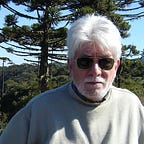How local journalism is key to refrain the extreme right trend
It was already known that ‘news deserts’ (cities without the press) create political apathy, encourage tolerance of corruption in the public service and nurture electoral absenteeism, but research carried out in Germany showed that the consequences could be much more serious. Data collected in the state of Baden-Württemberg showed that the far-right political party Alternative for Germany (AfD — acronym in German) jumped from 9.2% of previous electoral preferences to 19.3% in 2021 regional voting.
According to the work carried out by researcher Maxim Flosser (1) the lack of basic local news coverage happened in at least eight other German cities, especially those located in the former East Germany. The postgraduate academic student at the Faculty of Journalism at the University of Stuttgart gathered data showing a close relationship between newspaper closures and the political behaviour of voters, concluding that there is a worrying coincidence between the reduction of local news production and the simultaneous increase in votes given to AfD candidates.
The trend recorded in Flosser’s work confirms an identical phenomenon detected in the United States, in cities where former President Donald Trump’s ultra-conservative electorate has been growing despite ongoing accusations and criminal proceedings against the candidate for re-election by the Republican party. Still, in Germany, the German Federal Association of Digital Editors and Newspaper Editors warns that around 4,400 small and medium-sized cities in the country could become ‘news deserts’ by 2025, indicating a likely further increase in the volume of votes given to the party, which today it is the second largest political force in the country.
In countries of the Global South, we still don’t have academic research as detailed as that done by Maxim Flosser, but, in Brazil, according to the 2023 report of the project Atlas da Notícia (News Atlas) (2) there are 2968 cities where 29.3 million Brazilians (13.8% of the population) live in cities where there is less than one press organization focused on local information. It is a fertile field for political isolationism and informational denialism to feed anti-democratic political tendencies.
Reality data collected in several countries shows that the combination of lack of information and right-wing extremist tendencies is already a global phenomenon, which increases the importance of finding solutions to the global increase of ‘information deserts’. The real challenge is to understand how and why the closure of local newspapers influences the formation of opinions among residents of small and medium-sized cities or communities. It’s the so-called ‘million dollar question’, but some answers have already been researched, especially in the United States and Finland.
The news-based communication
One of the most plausible explanations is based on the concept of ‘news-based communication’, an English jargon to express the fact that the news delivered ready and finished by the conventional press is losing its power to attract people’s attention in favour of frantic sharing of data, facts, opinions, lies and rumours on virtual social media. This process becomes even stronger if we consider that the number of local news projects is falling steadily. In the US only, the graveyard of local newspapers increased last year by a weekly rate of 2,5 initiatives.
Today, people communicate by exchanging news, giving rise to new versions that make the core of the news-based communication process. It is a decentralized and unpredictable process subjected to rules that are still little known, but is challenging the centralization, the hierarchy as well as the norms and values that have governed the mainstream press for at least two centuries.
So far, the conventional news press provides people with information inputs formatted unidirectionally according to the culture and agenda of interests of the ruling elite. When the internet started to offer an enormous diversity of versions, ‘packaged’ news lost the privilege of being the only one to condition the formation of opinions in the immense unregulated public space created by social networks.
In this space, the most strident, paradoxical, impactful or sensationalist information tends to gain more visibility and attract attention, including from those who think otherwise, because it deviates from traditional standards. This is where the extreme right found fertile ground to challenge the norms in force in the liberal democratic system, as happened with the debates on flat earth, the challenge to vaccines and mystical-religious preaching.
The visibility obtained thanks to the use of controversial theories widely disseminated through social media allowed the extreme right to boost its electoral participation. Ultraconservatives gained an audience in the lower middle class by embracing evangelical messianism as an antidote to poverty and social frustration. The social elite and political opportunists, for their part, adopted denialism as the main tool to compete for electoral positions and jobs in public administration.
The changes in the flow of information on the internet combined with the financial difficulties of the conventional press gave enormous importance to the role of local journalism in reducing the ongoing political/ideological polarization. It is a problem that no longer affects only the journalists and communications entrepreneurs. It’s something that is also our responsibility, as citizens.
(*) English is not my native language. This text was translated from Portuguese with the help of Google Translator and Grammarly
(1) German original text
(2) Website in Portuguese
